There's
now a button in the column to the left (Film Reviews A-Z) which will
take you to a list of all the movies reviewed on the site and allow you
to link to them directly.
Monthly Archives: July 2007
FILMS REVIEWED
Amarilly Of Clothesline Alley
Apocalypto
Baby Face
The Bad and the Beautiful
The Bellboy
The Big Combo
The Big Trail
The Birds
Blind Husbands
Born Reckless
Bring Me The Head Of Alfredo Garcia
Casablanca
Cherry 2000
Cheyenne Autumn
Chimes At Midnight (Falstaff)
Chinatown
Citizen Kane
City Girl
The Civil War
The Clock
The Conformist
Contraband
Crime Wave
Daisy Kenyon
The Dark Corner
Diamonds Are Forever
Double Indemnity
Dracula (1931)
The Dreamers
El Cid
Electric Edwardians (DVD Collection)
Eternal Sunshine Of the Spotless Mind
Eyes Wide Shut
Falstaff (Chimes At Midnight)
Flesh and the Devil
Force Of Evil
Four Sons
G. I. Blues
The Garden Of Eden
The Ghost and Mrs. Muir
The Girl Can’t Help It
The Glass Bottom Boat
The Great K & A Train Robbery
Hangman’s House
He Who Gets Slapped
Headin’ Home
How Green Was My Valley
The Hunchback Of Notre Dame (1923)
I Confess/The Wrong Man
Intolerance
The Iron Horse
It’s All True
Just Pals
King Kong (2005)
The Ladies Man (1961)
Laugh, Clown, Laugh
Laura
Lawrence Of Arabia
Leap Year
Leave Her To Heaven
The Lord Of the Rings
Loving You
The Marriage Circle
The Married Virgin
Merry-Go-Round
Miss Lulu Bette/Why Change Your Wife?
Mr. Arkadin (Confidential Report)
My Best Girl
1900
Nosferatu (1922)
Odds Against Tomorrow
On Dangerous Ground
Out Of the Past
The Oyster Princess
Pandora’s Box
The Penalty
Peter Pan (1924)
Pilgrimage
Pitfall
Sadie Thompson (1928)
Saved
Scarlet Street
Seas Beneath
The Set-Up
Shadow Of A Doubt
The Shop Around the Corner
Show People
Spider-Man 2
Summer Magic
Sumurun
The Sundowners
They Live By Night
3 Bad Men
The Three Burials Of Melquiades Estrada
Titanic
Tobacco Road
Trapped
Uncle Tom’s Cabin (1927)
Up the River
Vertigo
Vicky Cristina Barcelona
War Of the Worlds (2005)
The Way Of Peace (Frank Tashlin Short)
What Time Is It There?
Why Change Your Wife?/Miss Lulu Bette
Why Worry?
The World Moves On
The Wrong Man/I Confess
THE FILM NOIR CANON
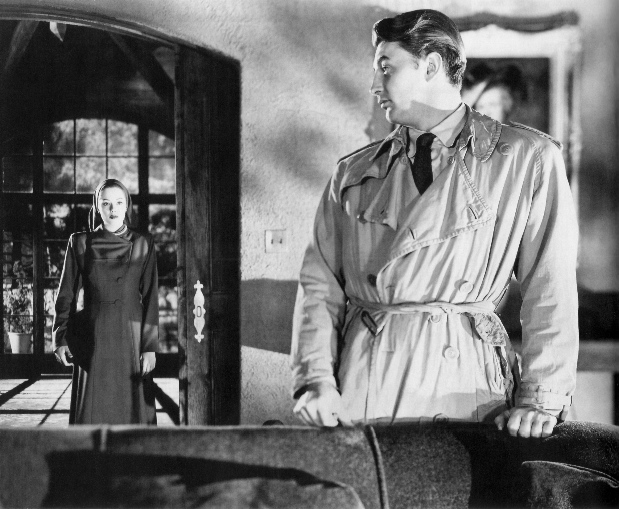
People who love film noir also love to argue about what films belong in the category and what films don't. They compile lists of films noirs and break them down into subcategories. The general drift of this activity is to call almost any film noir
as long as it was made in Hollywood in the 1940s or 1950s, in black
and white, and features moody lighting, cynical attitudes and
some content related to crime.
This inclusiveness is abetted by studio home video departments, which will designate any film with the above attributes a film noir because the label is sexy and apparently helps sell DVDs.
In the process, the term gets so vague as to be useless. I would
argue that there is a core set of films that are truly and uniquely noir,
reflecting a particular time in America, with a particular mind-set, a
mood of existential dread that seemed to invade the American psyche
after the end of WWII, at the beginning of the atomic age.
This sense of dread was in the air before then, of course, as the world
hurtled towards war. It can be felt very clearly in some dark
films made during the war — in Hitchcock's Shadow Of A Doubt, in Wilder's Double Indemnity, in Huston's The Maltese Falcon. The first two of those films, along with Leave Her To Heaven, fall into a distinct category of their own — the domestic noir.
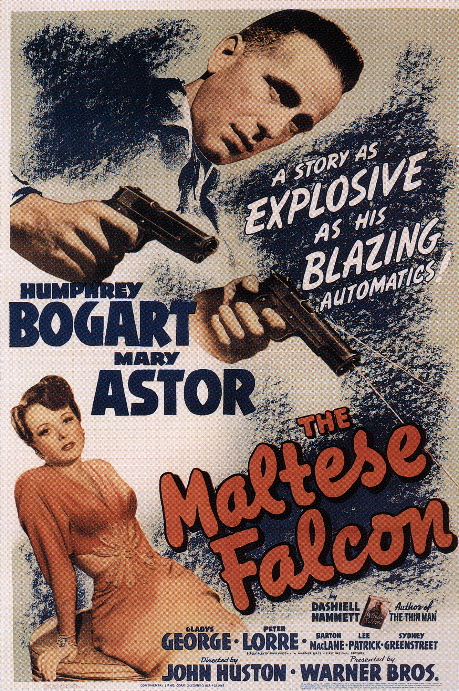
The Maltese Falcon seems on its surface to belong to another distinct category, the hardboiled detective thriller, which had noirish
elements but whose essentially noble protagonist rescued it from
existential dread. Yet Bogart's Sam Spade seems to be losing
faith in the nobility of his code, to see it as meaningless, and I
think that fact alone allows one to call The Maltese Falcon a true film noir. Just compare Bogart's Spade to his Phillip Marlowe in The Big Sleep, which plays like a hardboiled romantic comedy by comparison with Huston's film.
The point about The Maltese Falcon can be argued, of course, and I place it among the true films noirs with that reservation in mind. Here are some of the other films I think of as truly noir, without such reservations:
Out Of the Past
The Killers
His Kind Of Woman
The Dark Corner
The Set-Up
Gun Crazy
Fallen Angel
Angel Face
Touch Of Evil
Detour
The Wrong Man
Criss Cross
The Killing
In A Lonely Place
On Dangerous Ground
Crossfire
Where the Sidewalk Ends
Brute Force
The Sweet Smell Of Success
Night and the City
Thieves Highway
The Lady From Shanghai
14 Hours
The Long Night
Nightmare Alley
Odds Against Tomorrow
Act Of Violence
Crime Wave
They Live By Night
Decoy
The Big Steal
Side Street
Where Danger Lives
Tension
Kansas City Confidential
The Big Combo
Gilda
Note that not all of these films end badly for the protagonist, and not all of them feature femmes fatales — several actually have femmes
that rescue the protagonist, and in one of them the protagonist is
rescued, just as improbably, by Jesus. But in all of them the
protagonist needs rescuing, in all of them he's lost in a nightmare world that's
existentially different from the world that existed before WWII and he can't, by his own efforts, get out of it.
Even a film like His Kind Of Woman, which goofs comically on this world, is also recognizing it.
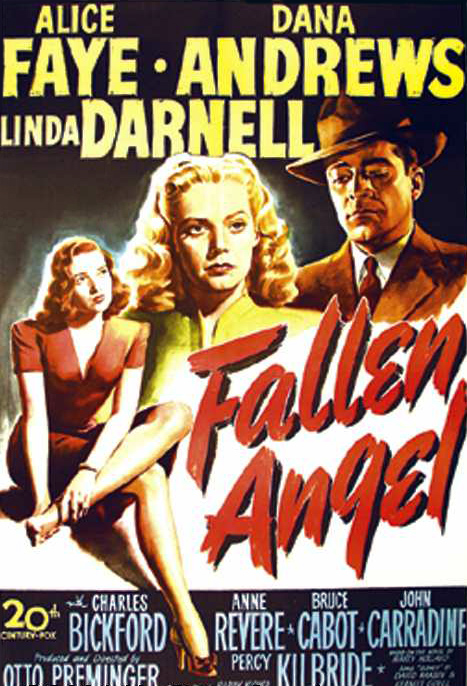
In future posts I'll list some of the films commonly called noir
which I don't think really are, because, though they may reflect to one
degree or another the same existential dread as the true noir,
they don't acknowledge it as a profound and inescapable condition.
It's almost a spiritual distinction, and therefore hard to
define precisely, but I think it's one worth making.
A BOUGUEREAU FOR TODAY
Bouguereau’s figures are so solid that when he sets them floating in the air the effect is unsettling, uncanny, but in a pleasant way, as flying in dreams is pleasant.
CHINATOWN

Chinatown is one of the few neo-noirs that really lives up to the designation. Its view of the world is truly bleak — a moral maze from which there is no escape. As with many films noirs there’s an indictment of the political system but also a sense that corruption
is universal, not limited to any one class. It’s an existential corruption.
The big difference between Chinatown and the classic post-WWII noirs is one of gender perspective. The post-war noirs were centrally concerned with male anxieties, with the way the world looked from the point of view of a suddenly inauthentic and insecure
manhood. In them, a man might be ruined by a powerful female, a traditional femme fatale, or he might be saved by good woman, but in both cases the situation was beyond his control. Chinatown finally took a look through the other end of the telescope, imagining what the general collapse of manhood might mean for women.
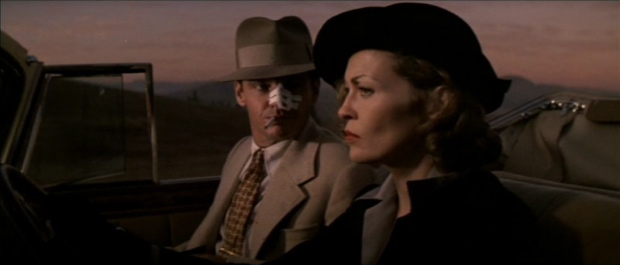
As screenwriter Robert Towne has said, Evelyn Mulwray is the only
character in the film who operates out of purely decent motives, trying
to rescue herself and her daughter from the clutches of a rancid,
decayed patriarchy. The protagonist of the film, private eye
Jake Gittes, is a decent enough fellow but impotent when it comes to
helping, much less saving, her.
We’re not quite dealing with a feminist perspective here — we’re still
looking at the mess from a male viewpoint, assessing the male’s failure
of responsibility rather than exploring the female’s search for empowerment —
but we’re a long way from the phallocentric cry of male bewilderment and pain that
was at the heart of film noir.
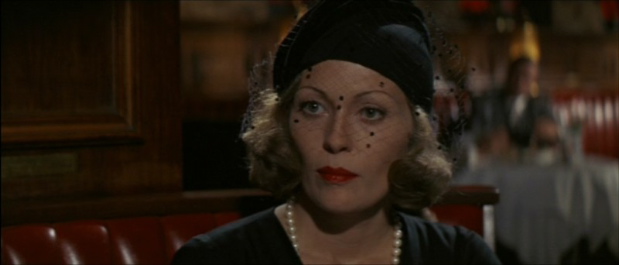
Still, the deconstruction of the traditional femme fatale
is very thorough and deliberate, because Evelyn Mulwray is first
presented as a kind of spider woman, with all the generic clues that
used to alert us to the fact that the woman in question was going to be
trouble . . . and that’s how Gittes constructs her. The big
switcheroo is that Evelyn is in much more trouble than she has the
capacity to cause anyone else, that it’s her father’s fault and that
Gittes isn’t smart enough or strong enough to deliver her from it.
Towne’s conversation with the noir tradition is very elegant and profound. He goes back, in the film, to 1937, to the hardboiled detective fiction out of which film noir mutated, and deconstructs the “tarnished knight” of that form, locating in him the existential nullity of the film noir protagonist. Gittes has Phillip Marlowe’s private code of nobility, his commitment to a kind of rough justice, but it’s not enough anymore. The only real nobility he has left is his ability to recognize the cost of his own impotence.
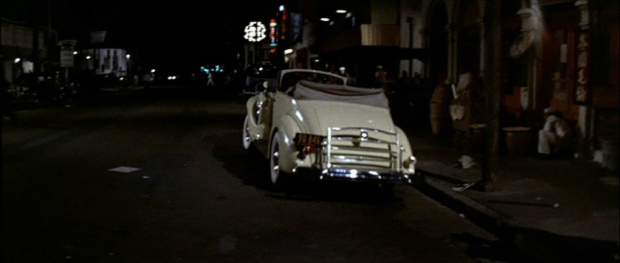
When his associate speaks the film’s famous last line to him, “Forget
it, Jake — it’s Chinatown,” we know he won’t, we know he can’t.
He lives there now — and somehow, because of his failure, we all do.
